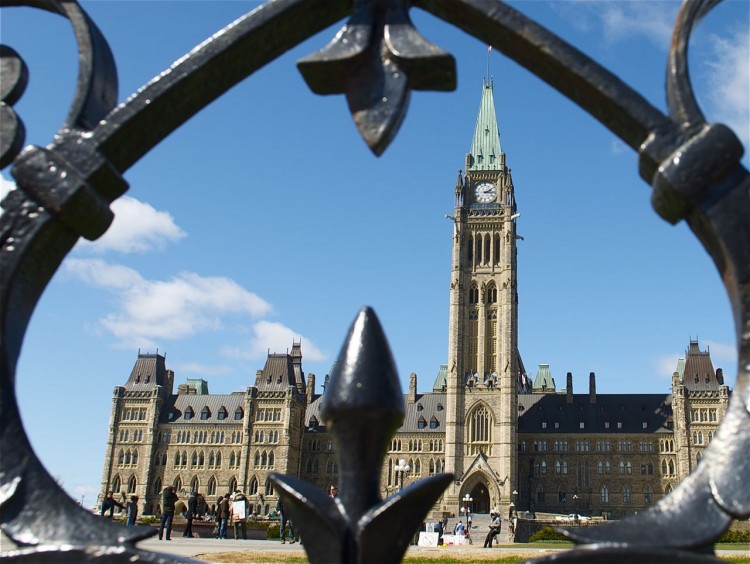
A view of Centre Block on Parliament Hill in Ottawa, the seat of Canada’s government, in a file photo. (Matthew Little/The Epoch Times)
Commentary
The inquiry into the use of the Emergencies Act is generating plenty of interest and commentary, but one thing that I haven’t seen discussed yet is the implications that the commission’s findings may eventually have for further lawsuits or claims against the federal government, or against various individuals within the government, such as the prime minister.
There’s a portion of the Emergencies Act (Part V) that’s titled “Compensation.” It says that the government can pay reasonable compensation to any person who suffered a loss, injury, or damage as a result of the use of the Emergencies Act. In fact, it actually goes further: It says the Minister “shall” award compensation, subject to the regulations (which unfortunately haven’t been written yet) and on condition that the applicants for the compensation sign a full release of rights to sue the Crown.
The payment of compensation doesn’t seem to be contingent upon the inquiry finding that the invocation of the Emergencies Act either was or wasn’t justified. It appears to be simply a way to soften the blow against specific individuals who suffered by spreading the cost among taxpayers instead. Individuals who were harmed have a tendency to complain about it, sometimes loudly, thereby drawing public attention to the damage that was done. By contrast, taxpayers who are compelled to pay into the government’s gigantic slush fund through routine tax payments will never know how much of their money went to paper over the damage suffered by individuals due to the invocation of the Emergencies Act.
So the compensation clause is simply another socialist way of making the government seem humane.
The more interesting portion of Part V is subsection 47(1), titled “Protection from personal liability.” This section prevents anyone from suing a Minister of the Crown (which would include Prime Minister Justin Trudeau, Deputy PM Chrystia Freeland, etc.) and all employees and agents of the Crown with respect to anything they did or omitted to do under the Emergencies Act, so long as they acted “in good faith.” Presumably, if it could somehow be shown that these individuals did not act in good faith, then they could be sued.
It will therefore be crucially important, when the time comes for us to hear from Trudeau and Freeland as witnesses, to attack the bona fides (good faith) of their intentions in invoking the act. Some of the evidence that we’ve heard already makes it seem clear that even among various government employees, there were wide differences of opinion as to the necessity of proclaiming an emergency.
More importantly, however, citizens should start questioning why exonerating clauses such as 47(1) of the Emergencies Act are being included in recent legislation. I, for one, am very tired of having governments apologize for something horrible that they or their predecessors in office did in the past, and then throw tax money at it in a misguided attempt to make things right, when the very people who dreamed up that policy, voted in favour of it, then carried it out, are still alive and walking around among us free from any personal liability for their wrongdoings.
Ontario adopted similar legislation exonerating its politicians and bureaucrats from liability immediately prior to the pandemic. (What convenient timing!) Section 11 of the Crown Liability and Proceedings Act exists for the explicit purpose of extinguishing causes of action against an officer, employee, or agent of the provincial Crown for negligence, regulatory decisions, policy decisions, etc. It shifts all the financial responsibility to the Crown itself, so that if damages are ever ordered to be paid, the compensation will all come out of the public purse but never out of the pockets of the miscreants who enacted such laws, policies, and regulations.
I think it’s high time that we held individual legislators, and individual bureaucrats, personally responsible for the damage they’ve instigated and implemented against hapless victims under their control.
Does this mean people would be afraid to run for office or hold a civil service job? They darn well should be if they think the policies and actions they advocate might harm others. Who needs a bunch of cowardly legislators and bureaucrats willing to experiment upon their fellow citizens but not take financial responsibility for any of the harm they do?
Canada has not only exonerated its elected officials and employees, but has also extended the same protection to pharmaceutical companies, who can go about merrily injecting people with novel “vaccinations” while basking in the protection of a government indemnification against all tort liability. Not only is this morally wrong, it’s also quite predictably resulting in the abandonment of any semblance of caution on the part of those who know they are liability-free.
According to the website of the Public Order Emergency Commission, Justice Rouleau is also tasked with conducting a policy review of the legislative and regulatory framework, including “whether any amendments to the Emergencies Act may be necessary.”
I submit that repealing section 47 would be a useful amendment to assure the public that the unnecessary invocation of the act won’t occur again.
Views expressed in this article are the opinions of the author and do not necessarily reflect the views of The Epoch Times.
